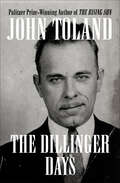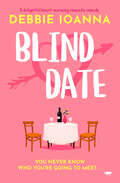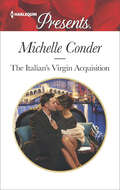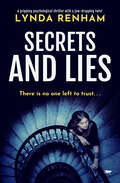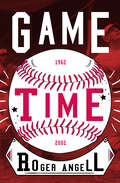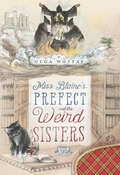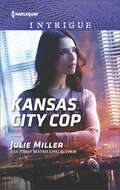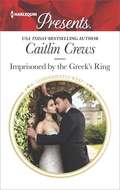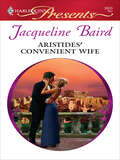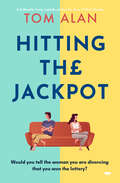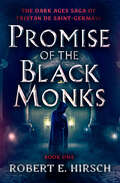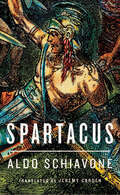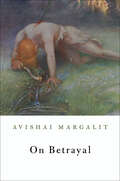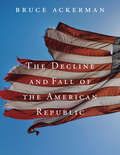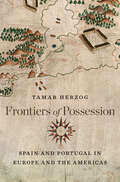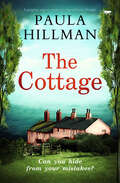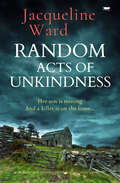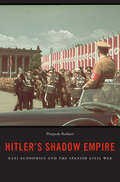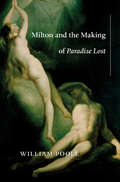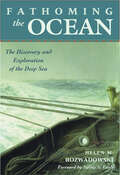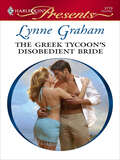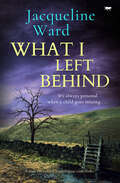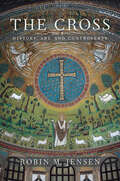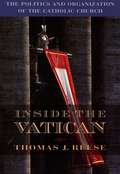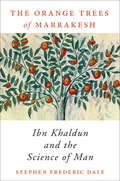- Table View
- List View
The Dillinger Days
by John TolandA deeply researched account of Depression-era criminals who roamed the Midwest by the Pulitzer Prize–winning, New York Times–bestselling author. John Dillinger and his compatriots&’ crime spree lasted a little over a year in the 1930s and left a trail of bodies in its wake. Dillinger&’s bank robberies—and his ability to elude both a half-dozen state police forces and the FBI—kept Americans riveted during this bleak economic period. In this book, the author of the classic The Rising Sun chronicles Dillinger&’s short criminal career and the exploits of other outlaws of the time . The eminent twentieth-century historian conducted hundreds of interviews and visited banks, jail cells, and other relevant sites in thirty-four states. Leading up to Dillinger&’s violent death outside a Chicago movie house, this true-crime story is told with great depth and vivid detail. &“This is the famed Dillinger&’s story, a compendium as well of the murderous doings of compatriots like Ma Barker, Pretty Boy Floyd, Bonnie Parker, the Barrow Brothers, and a host of other hip-shooting, car-stealing bank robbers who made underworld American history in the Depression. . . [A] brutal yet colorful book.&” —Kirkus Reviews
Blind Date: A delightful heart-warming romantic comedy
by Debbie IoannaEveryone&’s hounding her to find the perfect man—but date after date, she just seems to be flirting with disaster . . . Jenny is just fine with being single and spending evenings with her cat, Bing Clawsby—even if he does have a habit of leaving dead mice, and other unpleasant things, in the most unexpected places. Besides, she has a friend with benefits to turn to when she needs company. But her engaged best friend is nagging her to go on blind dates and get onto the dating apps. Not to mention her mother, who is desperate for Jenny to settle down. So she gives in to the pressure—and endures a string of disastrous and awkward encounters that make picking up after Bing seem fun in comparison. Forget the guy who carries live rodents in his pocket. Forget the guy who showed up naked on FaceTime. The only man who really gets her heart racing is her workmate Zack . . . but she&’s convinced he&’s out of her league. Will Jenny ever find non-feline companionship—or is she destined to stay single for good?
The Italian's Virgin Acquisition
by Michelle ConderTo claim his legacy, a billionaire needs to broker the deal of his life with a once-in-a-lifetime woman in this unforgettable romance.Sebastiano Castiglione has a problem. His lifestyle of decadent hedonism has convinced his grandfather to retain control of the family dynasty. To take what’s owed him, Bastian must prove he’s a changed man. The sight of his stunning intern sparks an idea—and the flames of a burning desire!Innocent Poppy Connolly will not become another Castiglione acquisition—but she cannot refuse Bastian’s offer of three chances to change her family’s life. Her response to his smoldering physicality is shocking, and it won’t be long before the molten heat of Bastian’s gaze melts away all her resistance . . . “I closed the back cover with a happy sigh. This is what I want when I read a Harlequin Presents. A break from my life, a few hours reading something with characters I can like and situations that aren’t too wild or unbelievable. I loved it . . . Grade: A.” —The Good, the Bad and the Unread“Ms. Conder has penned a marvelous read in this book where the chemistry was strong and the romance wonderful, because it illustrates perfectly just how much opposites attract.” —Harlequin Junkie
Secrets and Lies: A gripping psychological thriller with a jaw-dropping twist
by Lynda RenhamA couple looks forward to a promising future in a new house—but a past darkness threatens to destroy it, in a new thriller by the author of Remember Me. It&’s Flora and Adam&’s dream home: Hunters Moon, in the peaceful English village of Penlyn. Adam&’s political career has just taken a turn for the better, and the only thing left to complete the couple&’s happiness is a baby. Adam believes Hunters Moon will give them the new start they need—and help Flora overcome a recent miscarriage. But Flora senses something odd about the house and soon realises it isn&’t all it seems. Did the previous owner commit suicide or was she murdered? What are the villagers hiding? Is the lake at the bottom of the garden as peaceful as it seems? Soon Flora finds herself entrapped in a web of deceit with no one to turn to—and her dream home starts to become her nightmare . . .
Game Time
by Roger Angell&“Baseball&’s most eloquent analyst&” demonstrates why he has &“long since attained the status of national treasure,&” in this classic essay collection (The New York Times Book Review). Roger Angell's famous explorations of the summer game are built on acute observation and joyful participation, conveyed in a prose style as admired and envied as Ted Williams&’s swing. Here is Angell on Fenway Park in September, on Bob Gibson brooding in retirement, on Tom Seaver in mid-windup, on the abysmal early and recent Mets, on a scout at work in backcountry Kentucky, on Pete Rose and Willie Mays and Pedro Martinez, on the astounding Barry Bonds at Pac Bell Park, and more. With twenty-nine essays divided between spring, summer, and fall, Game Time carries readers through the arc of the season with refreshed understanding and pleasure. With an introduction by Richard Ford, this collection represents Angell&’s best writings, from spring training in 1962 to the explosive World Series of 2002.A New York Times Notable Book
Miss Blaine's Prefect and the Weird Sisters (The Prefect's Adventures #3)
by Olga WojtasA resourceful middle-aged Scottish librarian travels back in time to stop Macbeth and his wife from killing Duncan while avoiding three dangerous witches. Shona McMonagle is your ordinary, garden-variety librarian: comfortably padded, in her middle years, expert in various arcane martial arts. She also has an impressive knack for time travel (&“impressive&” may be overstating things: her first two forays—revolutionary Russia, 19th-century France—went less than smoothly). Her latest mission? Head to 11th-century Scotland, cozy up to Macbeth and Lady M, prevent them from murdering Duncan. In the ordinary course of things, this would be a doddle. But then there are the witches, who prove remarkably quick to take offense. And the business of being turned into a mouse. And the fact that the mission is in truth threefold. One, keep Duncan alive and kicking; two, correct the historical record and lay bare the ludicrous lies introduced by that silly Shakespeare play; and three, burnish the honor of the Marcia Blaine School for Girls, the finest institution of pedagogy in the greater Edinburgh area. Can she do it? Of course, she can! NEVER UNDERESTIMATE A LIBRARIAN! Praise for Miss Blaine&’s Prefect and the Vampire Menace&“Excellent…. The zany plot is a whirling dervish of unexpected events, all narrated with aplomb and wry wit by the eruditeand intrepid librarian,who often hilariouslymisconstrues the clues she ferrets out. Readers will have a rollicking good time.&” —Publishers Weekly (starred review)&“Effortlessly blends together a number of genres.... Smart, funny and all-round good company, wherever Shona goes, readers will eagerly follow.&” —The Scotsman
Kansas City Cop: Appalachian Abduction (The Precinct #4)
by Julie MillerFrom a USA Today–bestselling author, a policewoman finds a sexy partner to help her recover from a career-changing injury—and hunt down a murderer.After a gunshot rips streetwise police officer Gina Galvan from the line of duty, all she wants is to return to the front line and stop a shooter. But good guy physical therapist Mike Cutler won’t back down from a challenge, or his blazing attraction to Gina. Without a badge or a gun, Mike is ready to face anyone—including the killer that still lurks—to prove he’s every inch a hero.
Imprisoned by the Greek's Ring: Consequence Of His Revenge (one Night With Consequences, Book 40) / Imprisoned By The Greek's Ring (conveniently Wed!, Book 4) (Conveniently Wed! #4)
by Caitlin CrewsWrongly imprisoned for murder, a ruthless Greek is out for revenge—by marrying the woman who put him behind bars—in this dark and sexy romance. After spending a decade in prison, Atlas Chariton is exonerated and set free. But he never forgot the way Lexi Haring’s testimony condemned him in the eyes of the jury. Evan as justice is finally served, he won’t be satisfied until he gets his revenge . . . Though she told the truth on the stand, Lexi has always felt guilty for the role she played in Atlas’s fate. Now, the only way to escape a terrible fate of her own is to accept his hand in marriage! But once betrothed, the bliss of her sensual surrender threatens to unravel his carefully laid plan for vengeance . . .
Aristides' Convenient Wife
by Jacqueline BairdTo keep the fortune in the family, a tycoon seduces his nephew’s guardian in this classic contemporary romance by a USA Today bestseller.Leon Aristides believes in money, power, and family. So when his sister dies, leaving a son, he acts quickly and ruthlessly. He finds the woman who has guardianship of his nephew and insists she marry him!Helen knows that Leon believes her to be a money-hungry, experienced woman of the world—until their wedding night reveals otherwise! But Helen wants more than an incredible lover . . . she wants a loving husband!Originally published in 2007.
Hitting the Jackpot: A brilliantly funny comedy perfect for fans of Nick Hornby
by Tom AlanHis wife is leaving him. He&’s just won the lottery. Does she really need to know? A hilarious debut novel of love, luck, and hard-to-keep secrets . . . A thirty-something English teacher and amateur linguist, Jack just about makes ends meet—as does his Aussie fitness-instructor, soon-to-be ex-wife. She&’s finally run out of patience with Jack. What she doesn&’t know is that Jack has hit the jackpot: well over two million pounds in lottery winnings. Swearing his brother to secrecy, Jack figures this unexpected fortune will go a long way toward cushioning the blow of his divorce. But keeping his win a secret from his wife proves to be a harder task than Jack first imagines, especially as she knows his favourite numbers, so is convinced that he has won and is deliberately trying to cut her out. Jack&’s problems deepen when his shiny new BMW is hit by another car—driven by the shaken and disheveled but gorgeous Milly . . .
Promise of the Black Monks (The Dark Ages Saga of Tristan de Saint-Germain)
by Robert E. HirschReligious war erupts between church and king and shapes a young man&’s fate in eleventh-century France . . . Born of nobility in France in the year 1066, seven-year-old Tristan de Saint-Germain has his fate thrown to the winds upon the execution of his father for treason against William the Conqueror of Normandy. Abandoned by his mother, who remarries and departs for England, Tristan and his four-year-old brother, Guillaume, find themselves thrown into the monastic world of the Benedictine Black Monks of Cluny, France. Under the tutelage of Grand Prior Odo de Lagery, who one day will ascend to the very pinnacle of power within the Catholic Church in Rome, Tristan develops into an academic and linguistic prodigy by the age of twelve and becomes known as the Promise of the Black Monks. Tristan&’s unusual talents will become useful to the Benedictines, as well as to Rome—and the boy soon finds himself pulled into the visceral power struggle between Pope Gregory VII and Emperor Heinrich IV as they mercilessly wage spiritual, political, and military war upon each other to claim supremacy over the continent of Europe . . .
Spartacus (Revealing Antiquity)
by Aldo Schiavone“Separate[s] the man from the myth. . . . Both the newcomer and the experienced Roman historian will find a wealth of entertainment and information.” (Publishers Weekly)Spartacus (109?–71 bce) has been a source of endless fascination, the subject of myth-making in his own time, and of movie-making in ours. In this riveting, compact account, Aldo Schiavone rescues Spartacus from the murky regions of legend and brings him squarely into the arena of serious history.Schiavone transports us to Italy of the first century bce, where we encounter Spartacus, who is enslaved after deserting from the Roman army to avoid fighting against his native Thrace. Imprisoned in Capua and trained as a gladiator, he leads an uprising that will shake the empire to its foundations.While the grandeur of the Spartacus story has always been apparent, its political significance has been less clear. Often depicted as the leader of a class rebellion, Spartacus emerges here in a very different light: the commander of an army whose aim was to incite Italy to revolt against Rome and to strike at the very heart of the imperial system. Surprising, persuasive, and highly original, Spartacus challenges the lore and illuminates the reality of a figure whose achievements, and whose ultimate defeat, are more extraordinary and moving than the fictions we make from them.“A highly readable, interesting inquiry into a man and a movement.” —Booklist“You've seen the movie: now get the straight dope.” —Maclean’s magazine“[A] thought-provoking discussion of Spartacus and of first-century slavery.” —The Wall Street Journal“An intelligent, learned, and challenging account.” —New York Review of Books
On Betrayal
by Avishai Margalit“Seamlessly combines analytic rigor with personal memoir . . . its arguments are drawn from political history . . . Biblical commentary . . . novels and biographies.” (Amélie Rorty, Tufts University)Adultery, treason, and apostasy no longer carry the weight they once did. Yet we constantly see and hear stories of betrayal. Avishai Margalit argues that the tension between the ubiquity of betrayal and the loosening of its hold is a sign of the strain between ethics and morality, between thick and thin human relations. On Betrayal offers a philosophical account of thick human relations?relationships with friends, family, and core communities?through their pathology, betrayal.Judgments of betrayal often shift unreliably. A traitor to one side is a hero to the other. Yet the notion of what it means to betray is remarkably consistent across cultures and eras. Betrayal undermines thick trust, dissolving the glue that holds our most meaningful relationships together. On Betrayal is about ethics: what we owe to the people and groups that give us our sense of belonging.Drawing on literary, historical, and personal sources, Maraglit examines what our thick relationships are and should be and revives the long-discarded notion of fraternity.“Provocative and illuminating.” —Michael Walzer, Institute for Advanced Study“Witty and wise, precise and profound, On Betrayal is an easy but deep read: it sees life as it really is with all its turmoil.” —The Christian Century“The range of Margalit’s examples is astonishing. . . . He is much more knowledgeable about and comfortable with communities (and in communities) than most philosophers are, and so he is very good at recognizing when they go wrong.” —New York Review of Books
The Decline and Fall of the American Republic (The Tanner Lectures #12)
by Bruce Ackerman“Audacious . . . offers a fierce critique of democracy’s most dangerous adversary: the abuse of democratic power by democratically elected chief executives.” (Benjamin R. Barber, New York Times bestselling author of Jihad vs. McWorld )Bruce Ackerman shows how the institutional dynamics of the last half-century have transformed the American presidency into a potential platform for political extremism and lawlessness. Watergate, Iran-Contra, and the War on Terror are only symptoms of deeper pathologies. Ackerman points to a series of developments that have previously been treated independently of one another?from the rise of presidential primaries, to the role of pollsters and media gurus, to the centralization of power in White House czars, to the politicization of the military, to the manipulation of constitutional doctrine to justify presidential power-grabs. He shows how these different transformations can interact to generate profound constitutional crises in the twenty-first century?and then proposes a series of reforms that will minimize, if not eliminate, the risks going forward. “The questions [Ackerman] raises regarding the threat of the American Executive to the republic are daunting. This fascinating book does an admirable job of laying them out.” —The Rumpus“Ackerman worries that the office of the presidency will continue to grow in political influence in the coming years, opening possibilities for abuse of power if not outright despotism.” —Boston Globe“A serious attention-getter.” —Joyce Appleby, author of The Relentless Revolution“Those who care about the future of our nation should pay careful heed to Ackerman’s warning, as well as to his prescriptions for avoiding a constitutional disaster.” —Geoffrey R. Stone, author of Perilous Times
Frontiers of Possession: Spain and Portugal in Europe and the Americas
by Tamar HerzogA “lucid” analysis of the territorial formation of Spain and Portugal in both Europe and the Americas (Publishers Weekly).Frontiers of Possession asks how territorial borders were established in Europe and the Americas during the early modern period and challenges the standard view that national boundaries are largely determined by military conflicts and treaties. Focusing on Spanish and Portuguese claims in the New and Old Worlds, Tamar Herzog reconstructs the different ways land rights were negotiated and enforced, sometimes violently, among people who remembered old possessions or envisioned new ones: farmers and nobles, clergymen and missionaries, settlers and indigenous peoples.Questioning the habitual narrative that sees the Americas as a logical extension of the Old World, Herzog portrays Spain and Portugal on both sides of the Atlantic as one unified imperial space. She begins in the Americas, where Iberian conquerors had to decide who could settle the land, who could harvest fruit and cut timber, and who had river rights for travel and trade. The presence of indigenous peoples as enemies to vanquish or allies to befriend, along with the vastness of the land, complicated the picture, as did the promise of unlimited wealth. In Europe, meanwhile, the formation and re-formation of boundaries could last centuries, as ancient entitlements clashed with evolving economic conditions and changing political views and juridical doctrines regarding how land could be acquired and maintained.Herzog demonstrates that the same fundamental questions had to be addressed in Europe and in the Americas. Territorial control was always subject to negotiation, as neighbors and outsiders, in their quotidian interactions, carved out and defended new frontiers of possession.Praise for Frontiers of Possession“Herzog succeeds in her aim of moving beyond the usually separate histories of Spain and Portugal—and of Europe and the Americas—to complicate the accepted understanding of national and imperial boundaries as immutable facts rather than as ongoing sites of contestation.” —William O’Connor, The Daily Beast“This book is about as thorough a research work as this reviewer has ever encountered . . . This is a truly innovative and well-documented interpretation of this topic.” —D. L. Tengwall, Choice“The best account we now have of the long legal and political rivalry between the world’s first modern imperial powers.” —Anthony Pagden, author of The Enlightenment and Why It Still Matters
The Cottage: A gripping suspense perfect for fans of Louise Douglas
by Paula HillmanA scandalous accusation sends a woman fleeing to the countryside, where she meets an enigmatic man who also has something to hide . . . After a teenage boy makes allegations of inappropriate behaviour, Evie Cooper goes back to her hometown. There, her old friend Alex, now a solicitor, can help her navigate the situation, as well as offer her a job to tide her over. Evie rents a cottage while she waits for the crisis to blow over; it&’s isolated and rundown, but it&’s cheap, and she finds the rural quiet soothing. After a local man, Jay, helps her out of a tight spot, she starts a friendship with him that quickly becomes romantic. But she senses a strange tension between Jay and Alex. Why does Jay seem to avoid Alex? Is there something Alex isn&’t telling her—and why would he keep it secret? Then Evie stumbles on a surprising revelation about Jay—and as the truth begins to emerge, she must decide who she can really trust . . .
Random Acts of Unkindness: A tense and twisting psychological crime thriller (The Jan Pearce Series #Vol. 1)
by Jacqueline WardHer son missing, a desperate detective hunts for clues in a decades-old case with possible connections to England&’s notorious Moors Murders . . . DS Jan Pearce struggles to focus on the job after her teenage son, Aiden, vanishes—and is frustrated when her colleagues presume that he&’s run away. While Janet works with her partner to take down local gangster Sean Connelly, she increasingly suspects Connelly may be involved in Aiden&’s disappearance. When it comes to searching for her son, though, she&’s on her own. The trail leads Jan to a property where she hopes to find Aiden—instead, she discovers two corpses. And when she learns that one of the deceased also had a son who went missing, she&’ll be plunged into mysteries both past and present . . .
Hitler's Shadow Empire: Nazi Economics and the Spanish Civil War
by Pierpaolo BarbieriA revealing look at Nazi involvement in the Spanish Civil War, their economic ambitions, how it came to be, and how they operated.Pitting fascists and communists in a showdown for supremacy, the Spanish Civil War has long been seen as a grim dress rehearsal for World War II. Francisco Franco’s Nationalists prevailed with German and Italian military assistance—a clear instance, it seemed, of like-minded regimes joining forces in the fight against global Bolshevism. In Hitler’s Shadow Empire Pierpaolo Barbieri revises this standard account of Axis intervention in the Spanish Civil War, arguing that economic ambitions—not ideology—drove Hitler’s Iberian intervention. The Nazis hoped to establish an economic empire in Europe, and in Spain they tested the tactics intended for future subject territories.The Nazis provided Franco’s Nationalists with planes, armaments, and tanks, but behind this largesse was a Faustian bargain. Through weapons and material support, Germany gradually absorbed Spain into an informal empire, extending control over key Spanish resources in order to fuel its own burgeoning war industries. This plan was only possible and profitable because of Hitler’s economic czar, Hjalmar Schacht, a “wizard of international finance.” His policies fostered the interwar German recovery and consolidated Hitler’s dictatorship. Though Schacht’s economic strategy was eventually abandoned in favor of a very different conception of racial empire, Barbieri argues it was in many ways a more effective strategic option for the Third Reich.Deepening our understanding of the Spanish Civil War by placing it in the context of Nazi imperial ambitions, Hitler’s Shadow Empire illuminates a fratricidal tragedy that still reverberates in Spanish life as well as the world war it heralded.Praise for Hitler’s Shadow Empire“A fascinating, beautifully written account of a plan for the German economic domination of Europe that was pushed in the 1930s by the Nazis but above all by non-Nazi and more traditionally oriented German economic bureaucrats. Barbieri makes us think again about the relationship between economics and racial policies in the making of Nazi aggression.” —Harold James, author of Making the European Monetary Union“Hitler’s Shadow Empire recasts our understanding of the German and Italian interventions in the Spanish Civil War. In this brilliant debut, Barbieri shows that informal imperialism played a more important part than fascist ideology in the way that Berlin looked at the conflict. Barbieri also has a keen ear for the continuing echoes of the Civil War for Spain—and indeed for Europe—today.” —Niall Ferguson, author of The Ascent of Money
Milton and the Making of Paradise Lost
by William Poole&“An authoritative, and accessible, introduction to Milton&’s life and an engaging examination of the process of composing Paradise Lost&” (Choice). In early 1642 Milton promised English readers a work of literature so great that &“they should not willingly let it die.&” Twenty-five years later, the epic poem Paradise Lost appeared in print. In the interim, however, the poet had gone totally blind and had also become a controversial public figure―a man who had argued for the abolition of bishops, freedom of the press, the right to divorce, and the prerogative of a nation to depose and put to death an unsatisfactory ruler. These views had rendered him an outcast. William Poole devotes particular attention to Milton&’s personal life: his reading and education, his ambitions and anxieties, and the way he presented himself to the world. Although always a poet first, Milton was also a theologian and civil servant, vocations that informed the composition of his masterpiece. At the emotional center of this narrative is the astounding fact that Milton lost his sight in 1652. How did a blind man compose this intensely visual work? Poole opens up the world of Milton&’s masterpiece to modern readers, first by exploring Milton&’s life and intellectual preoccupations and then by explaining the poem itself―its structure, content, and meaning. &“Poole&’s book may well become what he shows Paradise Lost soon became: a classic.&” —Times Literary Supplement &“Smart and original . . . Demonstrates with astonishing exactitude how Milton&’s life and―most impressively of all―his reading enabled this epic.&” ―The Spectator &“This deeply learned and lucidly written book . . . makes this most ambitious of early modern poets accessible to his modern readers.&” ―Journal of British Studies
Fathoming the Ocean: The Discovery and Exploration of the Deep Sea
by Helen M Rozwadowski&“[An] amiable, in-depth examination of the most critical era for the development of modern oceanography&” (Publishers Weekly). In a history at once scientific and cultural, Helen Rozwadowski shows us how the Western imagination awoke to the ocean's possibilities?in maritime novels, in the popular hobby of marine biology, in the youthful sport of yachting, and in the laying of a trans-Atlantic telegraph cable. The ocean emerged as important new territory, and scientific interests intersected with those of merchant-industrialists and politicians. Rozwadowski documents the popular crazes that coincided with these interests?from children's sailor suits to the home aquarium and the surge in ocean travel. She describes how, beginning in the 1860s, oceanography moved from yachts onto the decks of oceangoing vessels, and landlubber naturalists found themselves navigating the routines of a working ship's physical and social structures.Fathoming the Ocean offers a rare and engaging look into our fascination with the deep sea and into the origins of oceanography?origins still visible in a science that focuses the efforts of physicists, chemists, geologists, biologists, and engineers on the common enterprise of understanding a vast, three-dimensional, alien space. &“Rozwadowski greatly expands our own understanding, all while telling a story that is original, wide-ranging, and illuminating.&” —Margaret Deacon, Southampton Oceanography Centre, author of Science and the Sea: The Origins of Oceanography &“Required reading for anyone wanting to understand how the oceans have come to play the role that they do in Western knowledge.&” —Eric L. Mills, Dalhousie University and author of Biological Oceanography: An Early History, 1870-1960 &“Chronicles the birth of deep-sea oceanography, from early observations by Benjamin Franklin to the voyage of HMS Challenger in the 1870s. [Rozwadowski] weaves a rich narrative from the world of renowned as well as lesser-known oceanographers.&” —Nature
The Greek Tycoon's Disobedient Bride
by Lynne GrahamFate unites a Greek billionaire and an English gardener—whether they like it or not—in this classic contemporary romance by a USA Today bestseller.It amazed Ophelia that Lysander Metaxis—a Greek billionaire notorious for his harem of adoring women—wanted to marry her, a humble gardener with a crumbling old manor house and debts up to her ears.But soon she realized Lysander didn’t want her—he wanted her property and her body.But marry him she would, because she had no choice if she wanted to keep what she cherished most. And disobedient she would be, because her new husband had no intention of loving her. . . . Originally published in 2008.
What I Left Behind: A tense and twisting psychological crime thriller (The Jan Pearce Series)
by Jacqueline WardTo find a kidnapped child, a police detective with a hidden past must step into the spotlight—and into the crosshairs. DC Jan Pearce is a talented cop who keeps a low profile, toiling away on cold cases. Her new colleagues in Manchester don&’t know about her dark past and the real reason she left London—and she plans to keep it that way. But when the two-year-old daughter of a wealthy executive is abducted, Jan is torn. The father, as well as Jan&’s senior officer, are convinced an organized gang is behind it, but Jan senses something more personal at work. After traces of bomb-making material are found, however, the kidnapping escalates into a national security concern. The last thing Jan wants is to be on camera at a press conference. But to save a life, will she dare to put her own at risk?
The Cross: History, Art, and Controversy
by Robin M. Jensen&“This erudite history illuminates the social, cultural, as well as theological developments of the cross&” through 2000 years of its symbolic evolution (Library Journal). Jesus&’s death on the cross posed a dilemma for Saint Paul and the early Church fathers. Crucifixion was a humiliating form of execution reserved for slaves and criminals. How could their messiah and savior have been subjected to such an ignominious death? Wrestling with this paradox, they reimagined the cross as a triumphant expression of Christ&’s sacrificial love and miraculous resurrection. Over time, the symbol&’s transformation raised myriad doctrinal questions, particularly about the crucifix―the cross with the figure of Christ―and whether it should emphasize Jesus&’s suffering or his glorification. How should Jesus&’s body be depicted: alive or dead, naked or dressed? Should it be shown at all? Robin Jensen&’s wide-ranging study focuses on the cross in painting and literature, the quest for the &“true cross&” in Jerusalem, and the symbol&’s role in conflicts from the Crusades to wars of colonial conquest. The Cross also reveals how Jews and Muslims viewed the most sacred of all Christian emblems and explains its role in public life in the West today.
Inside the Vatican: The Politics and Organization of the Catholic Church
by Thomas S.J. ReeseA comprehensive examination of the world’s most complex religious organization.There are one billion Catholics in the world today, spread over every continent, speaking almost every conceivable language, and all answering to a single authority. The Vatican is a unique international organization, both in terms of its extraordinary power and influence, and in terms of its endurance. Popes come and go, but the elaborate and complex bureaucracy called the Vatican lives on. For centuries, it has served and sometimes undermined popes; it has been praised and blamed for the actions of the pope and for the state of the church. Yet an objective examination of the workings of the Vatican has been unavailable until now.Drawing on more than a hundred interviews with Vatican officials, this book affords a firsthand look at the people, the politics, and the organization behind the institution. Thomas Reese brings remarkable clarity to the almost Byzantine bureaucracy of congregations, agencies, secretariats, tribunals, nunciature, and offices, showing how they serve the pope and, through him, the universal church. He gives a lively account of how popes are elected and bishops appointed, how dissident theologians are disciplined and civil authorities dealt with. Throughout, revealing and colorful anecdotes from church history and the present day bring the unique culture of the Vatican to life.The Vatican is a fascinating institution, a model of continuity and adaptation, which remains constant while functioning powerfully in a changing world. As never before, this book provides a clear, objective perspective on how the enormously complex institution surrounding the papacy operates on a day-to-day level, how it has adapted and endured for close to two thousand years, and how it is likely to face the challenges of the next millennium.Praise for Inside the Vatican“Reese does an admirable job of lifting the veil of secrecy surrounding the Holy See to examine the nuts and bolts of the operation . . . [He] paints a revealingly human portrait of Vatican life . . . Ultimately, this is the merit of Inside the Vatican: Reese gets it right. And in [such] a place . . . that’s no easy task.” —Greg Burke, Time“[Reese] paints a clear, largely dispassionate and often compelling picture of Vatican operations and, in so doing, highlights the tensions that tear the church.” —Diego Ribadeneira, The Boston Globe“[T]his is a useful and even valuable study of the institutional centre of the Roman Catholic Church, and of the relations between the centre, and the worldwide network of local churches which go to make up the Church catholic. Dr. Reese . . . brings impressive qualifications and experience as a political scientist to this [study] . . . It is the special virtue of Dr. Reese’s study that he succeeds where many have failed in providing an analytic, critical and comprehensive account of how [the Vatican] works.” —Seán Mac Réamoinn, The Irish Times
The Orange Trees of Marrakesh: Ibn Khaldun and the Science of Man
by Stephen Frederic DaleAn examination of Khaldun’s Islamic history of the premodern world, its philosophical underpinnings, and the author himself.In his masterwork Muqaddimah, the Arab Muslim Ibn Khaldun (1332–1406), a Tunisian descendant of Andalusian scholars and officials in Seville, developed a method of evaluating historical evidence that allowed him to identify the underlying causes of events. His methodology was derived from Aristotelian notions of nature and causation, and he applied it to create a dialectical model that explained the cyclical rise and fall of North African dynasties. The Muqaddimah represents the world’s first example of structural history and historical sociology. Four centuries before the European Enlightenment, this work anticipated modern historiography and social science.In Stephen F. Dale’s The Orange Trees of Marrakesh, Ibn Khaldun emerges as a cultured urban intellectual and professional religious judge who demanded his fellow Muslim historians abandon their worthless tradition of narrative historiography and instead base their works on a philosophically informed understanding of social organizations. His strikingly modern approach to historical research established him as the premodern world’s preeminent historical scholar. It also demonstrated his membership in an intellectual lineage that begins with Plato, Aristotle, and Galen; continues with the Greco-Muslim philosophers al-Farabi, Avicenna, and Averroes; and is renewed with Montesquieu, Hume, Adam Smith, and Durkheim.Praise for The Orange Trees of Marrakesh“Stephen Dale’s book contains a careful account of the dizzying ups and downs of Ibn Khaldun’s political and academic career at courts in North Africa, Andalusia and Egypt. For these and other reasons The Orange Trees of Marrakesh deserves careful and respectful attention.” —Robert Irwin, The Times Literary Supplement (UK)“Historian Stephen Frederic Dale argues that Ibn Khaldun’s work is a key milestone on the road from Greek to Enlightenment thought, chiming with the radical reasoning of philosophers such as Montesquieu and Adam Smith.” —Barbara Kiser, Nature“Dale’s interest in Greco-Islamic philosophy contributes to this biography’s uniqueness . . . This work provides indispensable background information to truly appreciate this single most influential Islamic historian.” —R. W. Zens, Choice“Excellent scholarship on a fascinating subject.” —Publishers Weekly
